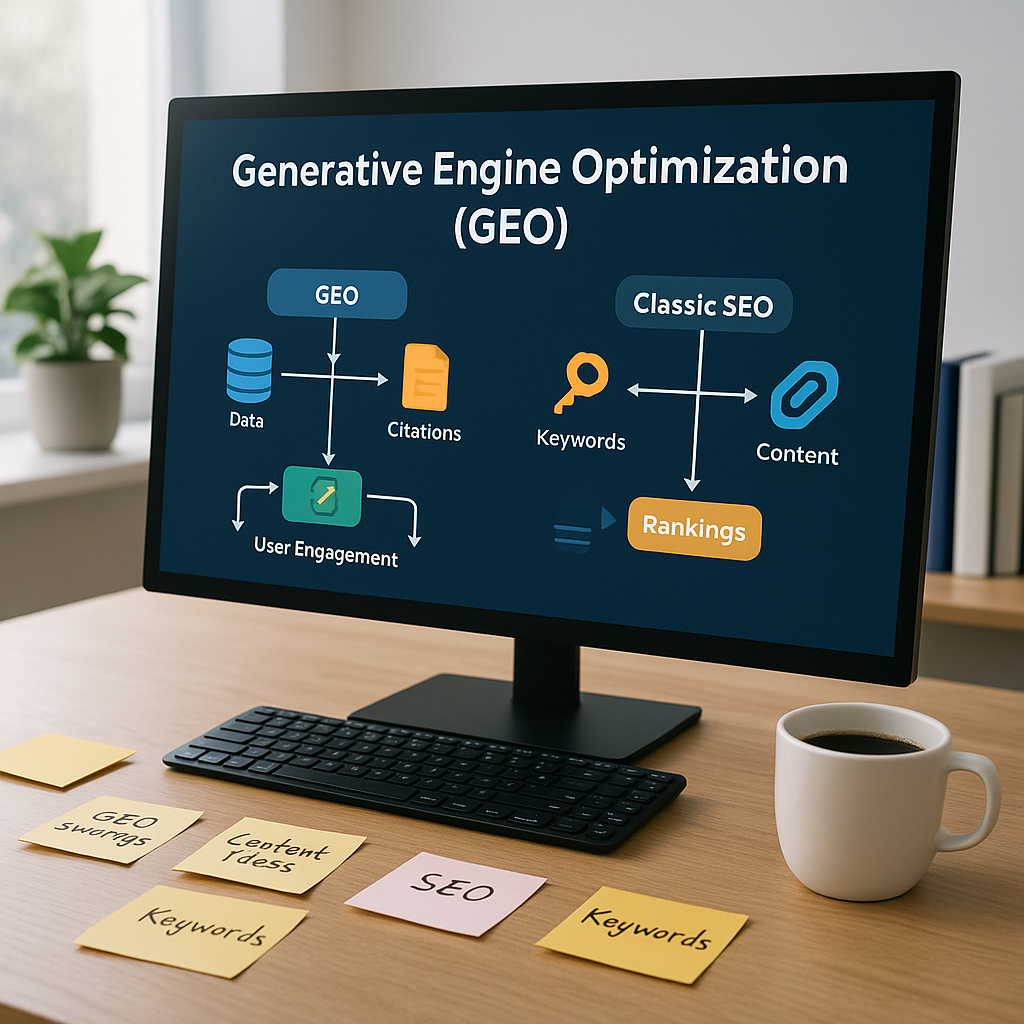
What Is Generative Engine Optimization (GEO)?
A Practical Guide for Marketers
Generative Engine Optimization (GEO) is how you make your brand, data, and content discoverable, citeable, and trustworthy to AI “answer engines” like ChatGPT, Perplexity, Google SGE, and Bing Copilot. Where classic SEO optimizes for a results page, GEO optimizes for a direct answer, often spoken or summarized, where your content is used as a source of truth and credited as a citation.
In other words: SEO gets you ranked; GEO gets you referenced.
Why GEO matters now
Search behavior is shifting from “10 blue links” to conversational answers. As more users rely on AI summarization, your website traffic becomes a downstream effect of being cited in those answers. Brands that adapt early will earn:
- Share of voice in AI answers (your data quoted or linked)
- Higher-velocity discovery (users learn your brand inside the answer)
- Trust transfer (citations from engines feel authoritative)
GEO vs. SEO (the short version)
- Consumer: SEO optimizes for crawlers/rankers; GEO optimizes for LLMs + retrieval systems.
- Content form: SEO favors pages; GEO favors answer-first, structured chunks with clean citations.
- Signals: SEO leans on keywords/links; GEO prizes schema, freshness, availability, and provenance.
- Distribution: SEO = your site + backlinks; GEO = your site plus open data (Wikidata), reference hubs (Wikipedia), code/data repos (GitHub), and press.
- Measurement: SEO tracks ranks/traffic; GEO tracks answer share, citations, and branded queries.
How generative engines “see” your content
- Crawl & Index: Engines still crawl sites, but also ingest public graphs and datasets (Wikidata, academic indexes), press, and social proofs.
- Retrieval: For a query, they fetch small, relevant text chunks (paragraphs, bullets, tables).
- Synthesis: The LLM composes an answer, often citing sources it trusts and can parse cleanly.
- Feedback loops: Engines monitor user satisfaction (follow-up questions, clicks) and evolve source selection over time.
Core GEO tactics (that actually work)
1) Build “answer-first” pages
- Lead with a concise, factual summary (what/why/how) in the first 100–150 words.
- Add scannable structure: H2/H3, bullets, numbered steps, FAQs, and comparison tables.
- Include clear, linkable claims (with data + date). Engines love standalone paragraphs they can quote.
2) Mark up your content
- Use schema.org (FAQ, HowTo, Product, Organization) and ensure JSON-LD validates.
- Maintain sitemaps and lastmod dates; keep pages fast (Core Web Vitals) and accessible (WCAG).
- Provide canonical URLs and prune duplicates to reduce ambiguity.
3) Publish primary data (and make it citeable)
- Release benchmarks, original research, definitions, or glossaries in tidy sections.
- Offer CSV/JSON downloads or an API if practical; reference methods and update cadence.
- Add methodology and sources so engines (and humans) trust the numbers.
4) Expand beyond your site
- Create or improve your Wikidata item and ensure Wikipedia references cite authoritative pages.
- Open-source relevant artifacts (code snippets, schemas, datasets) on GitHub with README context.
- Land press mentions and analyst coverage—both feed the knowledge graph that engines consult.
5) Make citations easy
- Use stable permalinks (no query-string chaos), predictable headings, and anchor links.
- Summarize complex pages with executive TL;DRs and key facts blocks that can be quoted verbatim.
- Avoid over-stuffed keywords; clarity beats density in a synthesis world.
Measuring GEO (yes, you can)
- Answer share: Regularly prompt answer engines with target queries; log whether you’re cited and where in the answer.
- Citation quality: Are engines pulling your numbers or definitions? Are links to the right page?
- Downstream signals: Track branded search volume, direct traffic, and referrals from answer engines (Perplexity shows sources).
- Time-to-refresh: How quickly do your updates propagate to the answers?
Tip: Build a monthly GEO audit—a simple spreadsheet of priority questions, whether you appear, what source was cited, and actions needed.
Common pitfalls to avoid
- Wall-of-text pages: Engines prefer clean chunks.
- Ambiguous authority: If your claim isn’t sourced (or conflicts with bigger sites), expect to be ignored.
- Neglected freshness: Stale dates push engines to newer sources.
- “Website-only” mindset: In GEO, off-site authority (open data, graphs, press) matters as much as on-site.
30-day GEO action plan
Week 1: Pick 10 buyer questions. Draft answer-first pages with schema + FAQs.
Week 2: Publish a data-backed post (include CSV + methodology).
Week 3: Create or update Wikidata/Wikipedia entries with neutral, sourced info.
Week 4: Run a GEO audit across engines; fix gaps (citations, clarity, freshness), and rinse monthly.
The bottom line
GEO doesn’t replace SEO; it extends it into an answer-first world. If you make your content structured, verifiable, and easy to cite, answer engines will use you as a source—and users will meet your brand inside the answer.
Want help building your GEO playbook? Uku Lab can audit your content, ship structured upgrades, and stand up a monthly GEO measurement loop in under 30 days.
.png?width=500&height=500&name=Uku%20Lab%20Main%20Logo%20(1).png)

